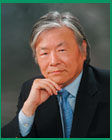On July 6, 2007, RIKEN placed another laurel on Prof. Susumu Tonegawa, outgoing director of the MIT Picower Institute for Learning and Memory, when they named him the first RIKEN Fellow. A role created, according to RIKEN President Noyori, to acknowledge those individuals who, by taking great risks, deepen our understanding of the world we live in. Noyori hopes that those now working at RIKEN will learn from these great minds, and grow. Just one month earlier, Tonegawa had already assumed duties for his new role as a Special Advisor to RIKEN Brain Science Institute precisely to deepen connections.
In his acceptance speech, the 1987 Nobel Laureate stepped outside of his scientific work to reflect on the fifty-year evolution of his relationship with science with those who packed the hall. Like a gambler, Tonegawa's mind was, and remains, open to opportunities that may answer the questions he seeks to answer in a patient, disciplined manner that never loses sight of the long-term goal.
"I am a molecular biologist," he stated more than once during the sixty-minute speech. Yet, while he may approach everything he does from that direction, he admitted that a discipline alone was not enough for a career in science. Even as an undergraduate he was less interested in established knowledge of a discipline than in the spaces left blank by such categorisation. In those "in-between spaces", Tonegawa says he was able to find ways into understanding and discovery. His discipline simply provided the foundations.
It also led him away from Japan. As an undergraduate in pursuit of a thesis project, Tonegawa had difficulty. Biology, he felt, had run its course and no answers to his questions were likely to be found there. Instead, guided by a wise advisor, he read about new ideas emerging in a new field-molecular biology. He was also encouraged to leave Japan for graduate school. Surprising, since travel was restricted for Japanese at that time.
But he was lucky. He found a new school in California with a dynamic mentor and was able to participate in the last part of the golden age of Molecular Biology. He even published one paper as a student. (No paper, by the way, emerged from his post-doctorate.) And, after seven years when the golden age showed clear signs of tarnishing, Tonegawa found himself looking at a nearly complete map just has he had in Japan with biology, in search of new territory to explore. He needed to find a new space.
Once again, Japan-unable to find space for him-turned him away. This time, he went to Europe, and started to work with immunologists. The other skills he learned from graduate and post-graduate opportunities went deeper than molecular biology and invaluable. He learned how to be selective in his choice of research projects-picking projects that broke new ground. He learned how to mentor younger minds by creating a vibrant atmosphere for students to work independently and without concern for funding. He learned to balance between adherence to a core project and openness that let talent grow.
Tonegawa learned to value arguments with students and colleagues. "Finding the link that connects controversies," is one route to discovery he said. To do this, interdisciplinary approaches are vital. He credits his success in solving the genetic problem of antigen diversity in immunology to his being an outsider, seeing the problems that had stalled immunological research from a new perspective. His laboratory broke the deadlock.
After thirteen years as a molecular biologist working in immunology, technology had finally started to catch up with his lingering questions about the underlying principles of life. It was now possible to look at genetic relationships to higher-level processes, such as thought and memory. So strongly identifying himself by his discipline, even when the tools needed to answer questions were not available, Tonegawa was easily able to shift gears and move into neuroscience to address those higher levels of complexity just has he had with antigen diversity. Same strategy: finding an in-between space and bringing a needed skill into the research approach.
And what advice does he have for researchers? Oddly enough, his words are remarkably familiar to another Nobel Laureate asked the same question during a visit to BSI just over a year ago: Be guided by your curiosity.






